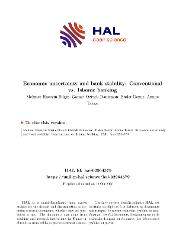| dc.contributor.author | Bilgin, Mehmet Huseyin | |
| dc.contributor.author | Danisman, Gamze Ozturk | |
| dc.contributor.author | Demir, Ender | |
| dc.contributor.author | Tarazi, Amine | |
| dc.date.accessioned | 2023-10-19T15:11:43Z | |
| dc.date.available | 2023-10-19T15:11:43Z | |
| dc.date.issued | 2021 | |
| dc.identifier.issn | 1572-3089 | |
| dc.identifier.issn | 1878-0962 | |
| dc.identifier.uri | https://doi.org/10.1016/j.jfs.2021.100911 | |
| dc.identifier.uri | https://hdl.handle.net/20.500.12469/5188 | |
| dc.description.abstract | In this paper, we explore whether economic uncertainty differently affects the default risk of Islamic and conventional banks. Using a sample of 568 banks from 20 countries between 2009 and 2018, we use the World Uncertainty Index (WUI) by Ahir et al. (2018) to conduct a study based on a comparable measure across countries. Our findings indicate that economic uncertainty increases the default risk of conventional banks but does not affect Islamic banks' default risk. To understand why, we explore the influence of religiosity, institutional factors, and bank-level heterogeneity. We observe that Islamic banks' default risk is not significantly affected by uncertainty in all types of countries, but such a difference with conventional banks mainly holds for banks with higher income diversification, larger size, and that are publicly traded. Moreover, our findings show that conventional banks suffer more from uncertainty in terms of stability in countries with higher religiosity and with a higher share of profit-loss sharing (PLS) contracts. Our results are robust to alternative estimation techniques to deal with endogeneity and to alternative variable measurements. | en_US |
| dc.description.sponsorship | Spanish Ministry of Science and Innovation, Spain [PID2020-114797GB-I00] | en_US |
| dc.description.sponsorship | We are grateful to the editor Iftekhar Hasan, two anonymous ref-erees, participants at the 34th Eurasia Business and Economics Society (EBES) Conference (2021) , and 2020 World Finance Banking Sympo-sium in Riga, Latvia for valuable feedback and discussions. Ender Demir acknowledges the financial support of the Spanish Ministry of Science and Innovation (grant no: PID2020-114797GB-I00) , Spain. | en_US |
| dc.language.iso | eng | en_US |
| dc.publisher | Elsevier Science Inc | en_US |
| dc.relation.ispartof | Journal of Financial Stability | en_US |
| dc.rights | info:eu-repo/semantics/openAccess | en_US |
| dc.subject | Policy Uncertainty | En_Us |
| dc.subject | Risk | En_Us |
| dc.subject | Credit | En_Us |
| dc.subject | Finance | En_Us |
| dc.subject | Volatility | En_Us |
| dc.subject | Aggregate | En_Us |
| dc.subject | Leverage | En_Us |
| dc.subject | Mergers | En_Us |
| dc.subject | Law | En_Us |
| dc.subject | Islamic banks | en_US |
| dc.subject | Conventional banks | en_US |
| dc.subject | Economic uncertainty | en_US |
| dc.subject | Bank stability | en_US |
| dc.subject | World uncertainty | en_US |
| dc.title | Economic uncertainty and bank stability: Conventional vs. Islamic banking | en_US |
| dc.type | article | en_US |
| dc.authorid | Tarazi, Amine/0000-0001-8385-2994 | |
| dc.authorid | Demir, Ender/0000-0003-4034-269X | |
| dc.authorid | Ozturk Danisman, Gamze/0000-0003-3684-6692 | |
| dc.authorid | Bilgin, Mehmet Huseyin/0000-0002-9897-9792 | |
| dc.identifier.volume | 56 | en_US |
| dc.department | N/A | en_US |
| dc.identifier.wos | WOS:000704335500013 | en_US |
| dc.identifier.doi | 10.1016/j.jfs.2021.100911 | en_US |
| dc.identifier.scopus | 2-s2.0-85112614313 | en_US |
| dc.institutionauthor | N/A | |
| dc.relation.publicationcategory | Makale - Uluslararası Hakemli Dergi - Kurum Öğretim Elemanı | en_US |
| dc.authorwosid | Tarazi, Amine/GQP-4387-2022 | |
| dc.authorwosid | Bilgin, Mehmet Huseyin/K-6487-2017 | |
| dc.authorwosid | Demir, Ender/J-8808-2017 | |
| dc.authorwosid | Ozturk Danisman, Gamze/P-1036-2019 | |
| dc.khas | 20231019-WoS | en_US |
















